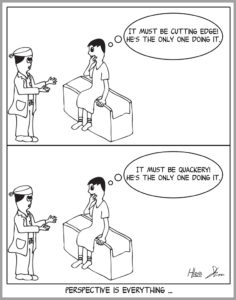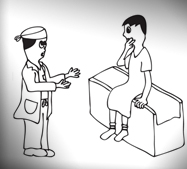
A senior resident of mine used to comment that after surgery, patients are either, “coming along, holding their own or zero delta.” This tongue-in-cheek formulation may be useful, simplified shorthand for residents on a busy service. But, of course, it glosses over the difficulties patients and families have dealing with neurosurgical conditions, with or without surgery. Most, if not all of the time, we are intensely engaged with our patients, especially those with whom we admit for elective procedures and have a strong desire to see recover completely after surgery. There is nothing wrong with that, but we must remain conscious of this bias, and not let it blind us to the very real problems with which even the patients who recover quickly and well often struggle.
It is well known that patient outcomes as reported by surgeons surpass those reported by patients. This is for benign and completely understandable reasons. There is the above-mentioned surgeons’ bias to want to see their patients get better; patients’ desire to please their doctor and to not “burden” them with postoperative complaints; and neurosurgeons’ awareness of just how close patients come to death, or indeed fates worse than that. If someone is walking, talking, seeing and working a year after removal of a large tuberculum sella meningioma, they do look great. It’s easy to tune out the headache, the decreased mental and physical stamina, the medication requirements they may have and the, “Doc, is this a screw I feel right here on my forehead?”
Several years ago, AANS Neurosurgeon featured an issue focused on neurosurgeons as patients. The September 2015 issue is different in its focus on patients and families, including those who have been through some of the hardest things imaginable; as they recover from such problems as brain injury, spinal cord injury, ruptured aneurysms and brain tumors. We hope this will help neurosurgical readers to remain aware and supportive of their patients’ needs, and to not gloss over the persistent problems that may seem minor in comparison to what could have been. And other readers should be reassured that when neurosurgeons say, “You look great,” we mean it to be an encouraging and optimistic message towards complete recovery.
[aans_authors]








